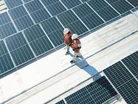Shell, bp, Tata Steel: Europe’s Energy Transition Could Stop

In a critical move, 74 leading organisations including giants like Shell, bp and Tata Steel have rallied together under a common cause.
They have issued an urgent call to the European Commission, signalling a stark need for proactive measures to enhance the clean energy sector.
Otherwise, they fear, the sector might witness a significant slowdown.
The 74 businesses – including companies, industry associations, NGOs and knowledge institutions – have signed a letter to the European Commission, warning:
- The development and growth of cleaner technology is stalling
- Investments are drying up
- Companies of all sizes are closing down
- Europe faces an industrial exodus.
The letter says: “The years ahead will be decisive for Europe’s industrial sector. By 2040, emission allowances will have run out and European industry is expected to reach zero emissions.
“Without intervention, Europe is heading towards an industrial exodus without any winners.
“We therefore urge the new European Commission to boost investments by focusing on demand creation.
“Demand creation means creating European markets near the end of value chains for cleaner industrial products.
“This will give European companies better prospects to invest in these products, allow Europe to retain a degree of autonomy and enable energy and raw material transitions to accelerate.”
The looming crisis of Europe's clean tech sector
The letter sets out reasons for the looming crisis, including:
Crumbling competitiveness
It says: “Investing in Europe was once the most normal thing in the world. Europe represents a huge market with ample knowledge, capital and excellent facilities.
“In recent years, however, its competitive position for industrial investment has started to crumble.
“Energy costs have risen sharply, labour is scarce and, on top of that, European markets are increasingly flooded by cheaper products from other parts of the world.”
Costly clean tech
Alarmingly, the report warns that European companies can rarely improve their competitive position by investing in sustainability.
It says: “This is because, barring exceptions, investments in cleaner technology increase production costs and selling prices. As a result, sustainable frontrunners in particular are pricing themselves out of the market, leaving the European industry stuck.”
With its business model under pressure, the industry is therefore unable to pay the additional costs of sustainability out of its own pocket.
Finding a solution
To combat these challenges, the groups champion a strategic approach centred around 'demand creation'.
This concept involves cultivating a European market near the end of value chains specifically for cleaner industrial products.
The fundamental idea is to enhance the business prospects for companies, enabling them to invest confidently in clean technologies while ensuring Europe retains a degree of autonomy and hastens its energy and raw material transitions.
“How can Europe maintain a degree of industrial autonomy while simultaneously achieving decarbonisation?" the consortium says.
“What is the way to link industrial policy and climate policy? How can European companies gain new perspectives, precisely by investing in cleaner technology?
“As signatories of this Call for Demand Creation, we believe that in addition to CO2 pricing through ETS and CBAM, we will need to focus on demand creation to achieve new investment prospects.”
It adds: “The additional cost of a cleaner product is not covered by subsidies but is part of the product price as a result of this requirement.
“In turn, investors get market-based compensation for manufacturing a more expensive but less carbon-intensive product.”
“By building on the example of E10 and introducing demand creation at the end of the value-chains of many more industrial products, investments can get going again.
“This could, for example, include markets for cleaner-produced plastics, synthetics, rubber, steel and several building materials and fuels.
"Demand creation through both public tenders and the private market is key.”
The plea for strategic change has garnered widespread support, evidenced by Shell's CEO Wael Sawan's personal appeal to the Commission on LinkedIn.
Shell said: "In September 2024, our CEO Wael Sawan appealed to the European Commission to boost European competitiveness in the energy transition.
“At Shell, we are ready to play our part in helping to shape a more competitive and secure Europe.
“We join more than 70 organisations in appealing to the new European Commission to put demand creation high on the agenda. This will give European companies more certainty and drive demand for low-carbon solutions.”
Other groups putting their name to the letter include:
- Vattenfall
- Tata Steel
- RWE
- Eneco
- bp
- Arcadis
- Corbion
- Ørsted.
The letter concludes with: “Of course we are open to further discuss and provide suggestions on how demand creation can become a reality. In this way, with combined efforts we can also shape the next phase of Europe’ energy and resource transition.”
Make sure you check out the latest industry news and insights at ClimateTech Digital and be part of the conversation at our global conference series, Sustainability LIVE.
Discover all our upcoming events and secure your tickets today. Subscribe to the ClimateTech Digital newsletter.
ClimateTech Digital is a BizClik brand




